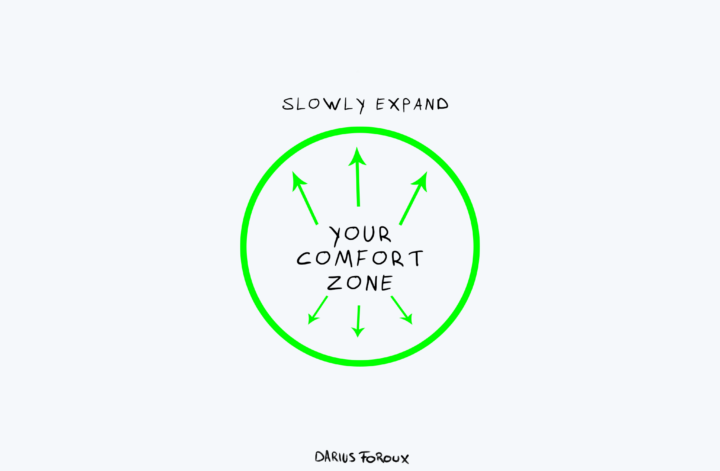I grew up in The Netherlands as a first-generation immigrant. Where I lived, people were mostly unemployed and in rough financial situations.
Growing up, I saw a lot of people with financial problems. That motivated me to avoid that fate. As I grew up and started learning more about money, I realized that most people who live in developed countries have opportunities to earn.
The problem is that they often have bad money habits. You can have a decent-paying job and still struggle.
Look, not everyone gets rich. That’s because you also need luck.
But since that’s outside our control, we can’t do anything about that. However, we can change our habits and work ethic.
When we rely on a system of habits that are designed to make us wealthier, we can be consistent and achieve financial freedom over time. Here are four of those habits.
1. Adopt an abundance mindset
Did you grow up in a family that lived from paycheck to paycheck so you’re always afraid you’ll run out of money? Or maybe you’re an investor who constantly checks the markets, afraid of missing out on the next hot stock?
The first obstacle to gaining financial freedom is ourselves. Once we become aware of our false money beliefs, we know what to fix.
One main thing is that most people have a scarcity mindset. They think small and think they can never build wealth. Instead, adopt an abundant mindset.
Become a creator, not a consumer. To me, that’s true abundance. You can create something from nothing.
Consumers never become wealthy because they only know how to spend. And they often spend on useless things that have no intrinsic value. Instead, create something valuable that people will pay for.
This could be a digital product (arts, books, etc.) or service (coaching, consulting, and so forth). When you have marketable skills, you can create value and gain another income stream.
2. Deeply understand your money
Get paid, spend, then wait for the next payday. That’s a common way to live your life until you retire. I used to be like that as well. Years ago, when I lived in London, I simply paid for things without paying much attention to my personal finances.
But we can’t get ahead financially until we understand what might be holding us back. This is how we get ourselves in dire financial situations.
It’s all about being aware of your finances. Here’s how you can do that:
- Track your expenses — where does your money go? How much comes in? How much goes out? Too many people know this but they don’t do it. You can sit down now and list your expenses in a few minutes.
- Create a money/income goal — I’ve talked about four phases of personal finance. Your goals depend on which phase you’re in. Try to be realistic and ambitious at the same time. It’s a difficult combination, but it will increase your chances of success.
- Work towards your goals consistently — Have you committed to saving a certain percentage of your income every payday? Then do it. Created a side-hustle? Work on it every day. It’s all about consistency.
It’s tempting to just take things as they come and avoid planning. But in the long-term, that strategy will not improve your situation. In fact, it makes it worse.
When you know where you stand financially, you can better see where you’re going.
3. Live below your means. Then increase your means.
I don’t like excessive budgeting because it makes life more complicated and stressful.
I simply live below my means. I know, it’s the most obvious thing in the world: Spend less than you make.
But honestly, it’s the only way to save money. You can invest that money later. And then, you can increase your means. Otherwise, you will stay stuck on one level. That’s not a good way to live.
No one wants to live in a dorm all their lives. We all want to afford better things. So it’s better when we have a plan on how to increase our income.
Having multiple income streams helps you to become wealthy faster. As the pandemic has shown, relying on a single income source is a very risky strategy.
So live below your means, but find ways to increase your means consistently over time.
Eventually, you will be able to afford that expensive trip or luxury item you want.
4. Automate your savings and investments
We all know we should save money and invest to take advantage of compounding. But knowing is different from doing.
Here’s the key to saving and investing consistently: Make it so easy that you don’t even have to think about it. Saving and investing are habits. Like any habit, the practice sticks better when it’s automatic.
I execute this by having 3 bank accounts. This is my 3-account strategy to save more money (investing comes later):
The normal checking account — This is where I put the money for my groceries, essentials, and other small purchases. It never contains more than $800 (it can be different for you, depending on your circumstances). This prevents me from impulse buying.
The fixed costs account — Mortgage payments, bills, and so forth; this account holds all my fixed expenses. And it’s set up for direct debit to my billers. This allows me to see my cost of living clearly at all times.
The savings account — Here’s where I keep six months’ worth of expenses as an emergency fund.
If you’re starting to invest, you can also set up an automatic transfer to a passive investment account, like the Vanguard S&P 500. You can start with small amounts.
Budgeting is popular but counterintuitive
I’m not against all forms of budgets. The key is to keep the budget phase temporary.
Maybe you suddenly lost your job or you came from an impoverished background. Whatever the case, there’s a way to gain something from nothing. During this phase of building something from nothing, you can live on a temporary budget.
Once you have an emergency fund — something enough to pay 6 months’ worth of living costs — then you can have more peace of mind and simply live below your means.
Who wants to live on a strict budget forever?
The problem with budgeting is that it puts us in a scarcity mindset. My family immigrated from Iran during a war. So I understand how my grandfather is super frugal.
He’s the type who wouldn’t buy anything new, even a cheap sweater, until the one he’s using is completely torn and damaged.
Exessive frugality causes stress. Living a financially free life means having a healthy relationship with money.




